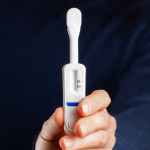On July 3, the U.S. Food and Drug Administration approved the first in-home rapid HIV test. Made by OraSure Technologies, the OraQuick In-Home HIV Test is an over-the-counter, oral swab test for HIV that gives results in 20 to 40 minutes. It’s estimated that 20 percent of the 1.2 million people living with HIV in the United States are unaware of their status. This is partly a result of barriers to traditional HIV testing. Will this new test help the one in five undiagnosed Americans learn of their positive status? Many health experts agree that the test—likely with a price tag of less than $60—will increase the convenience and frequency of HIV testing. Yet opponents of the new test are concerned that many at-risk people can’t afford the test and that those who receive a positive result at home will not get connected with counseling and care. (The kits come with a toll-free helpline accessible 24/7.) The OraQuick test is expected to be in stores this October, and the test’s impact on the epidemic remains to be seen. Here, POZ readers express their thoughts on how the at-home test could alter the HIV testing landscape.
This is encouraging news in the effort to further impede the spread of HIV. It would be very helpful if such a test could be developed for hepatitis B and C. These two viruses are not only deadly, but can hide for years in a person’s body and be [transmitted] in semen (hep B) and blood (hep C) and a few other ways. For the general public, this [at-home HIV test] would be great, but for those already infected with HIV, being able to test preventively your partner for hep B or hep C could mean the avoidance of a deadly new infection.
—Trent, Sparks, NV
As a person living with HIV and a certified HIV tester, I am 100 percent against this at-home test for many reasons. Realistically, if someone gets a positive result, how many of them are going to call the 800 number and self-report? Denial is also a huge factor here, and it will let the person continue risky behaviors and spread the virus even more. The counseling that comes with the test is vital to make a person understand the virus and [realize] that it is not a death sentence.
—Larry Frampton, Knoxville, TN
I am thrilled for this test—now people will be able to test themselves without ending up on some national database because they went to a doctor or free clinic that is required to [report their results]. It would be helpful if the kits contained contact info for unaffiliated support services that would help anyone with a positive test result, while also preserving their privacy. I think a well-done CD or DVD to address positive and negative results and resources to turn to would better prepare singles and couples for dealing with the magnitude of such news in the most comfortable way possible.
—SoulAsylum, Minneapolis, MN
Overall I am happy about the test becoming available. There will be abuses of it, certainly. I especially fear for sex workers “disposed of” by their pimps. I expect many negative partners will use this test on positive partners who haven’t disclosed. Eventually, poorer people will want the same ability to test their partners.
—Jeton Ademaj, Harlem, New York
I agree that this test is not a good idea. When I tested positive, I was at least told to go to Cascade AIDS Project and they [gave] me a lot of information and helped find a doctor that specializes in HIV. I would not have received any assistance from a home test. I think that the testing and treatment of HIV should be left up to the professionals.
—Keith, Portland, OR







Comments
Comments